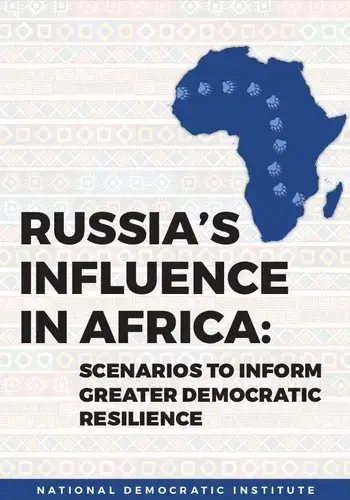For media inquiries, please contact Paulina Chavez [email protected].
Since 2014, Russia’s engagement with Africa has increased significantly and includes activities in the information space, illicit political financing, the security sector and extractive industries that threaten democracy on the continent. This report outlines four scenarios for how Russia’s involvement in Africa may change from 2023 to 2025 as a result of the costly war on Ukraine.
In the Emboldened Bear, the Kremlin continues and expands both legitimate and illicit operations in Africa through disinformation campaigns, activities in the mining industry, nuclear energy deals and the provision of military contractors and weapons supplies. Despite high costs for democracy in Africa, these operations yield high economic and foreign policy returns at low cost for the Kremlin and its proxies.
In the Bear Necessities, Russia aggressively seeks and protects alternative licit and illicit markets to circumvent sanctions, access strategic resources and maintain critical supply chains. However, in this scenario, due to capacity constraints, the Kremlin faces more capacity constraints and entrenches its presence in a limited number of African countries.
In the Hamstrung Bear, frustrated with the situation at home, Russian oligarchs and key individuals with links to the security apparatus seek more opportunities overseas. Russia faces significant capacity constraints and increased African awareness and criticism of its destabilizing role on the continent.
In the Bear Exposed, African civil society, institutions and selected leaders increasingly highlight and push back against the corrosive effects of the Kremlin’s activities on the continent. Rising skepticism among Africans about whether Russia can deliver benefits for the continent limits the Kremlin’s opportunities.
Each of the four scenarios reflects a different combination of two key uncertainties. However, all four scenarios illustrate that while limited and subject to change, Russia’s operations in Africa are a serious threat to democracy and stability. However, if their extractive, abusive, exploitative nature is exposed, they are also extremely vulnerable to public backlash. The Institute plans to use the scenarios to engage African and other international stakeholders on how the democracy support community can position itself to shore up democratic resilience to Russian operations that subvert popular demands for improved democracy.

